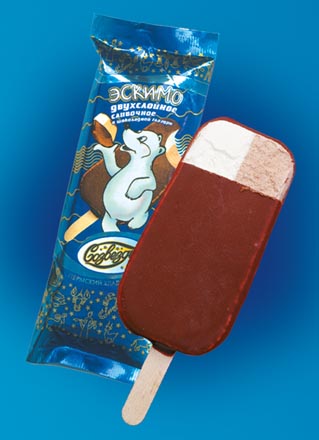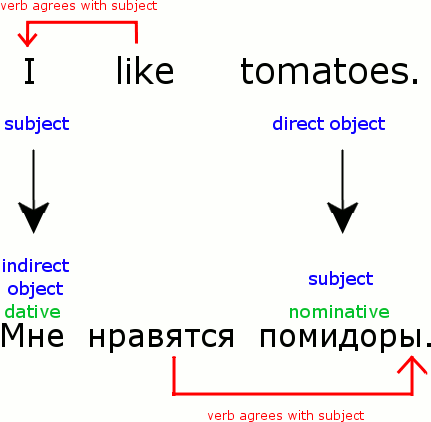Categories: "Grammar"
Выбирать/выбрать
Выбирать is the Russian word for "to choose," "to select" or "to pick." Here is how you conjugate the verb:
| Imperfective | Perfective | |
| Infinitive | выбирать | выбрать |
| Past | выбирал выбирала выбирало выбирали |
выбрал выбрал выбрала выбрало выбрали |
| Present | выбираю выбираешь выбирает выбираем выбираете выбирают |
No such thing as perfective present in Russian. |
| Future |
буду выбирать будешь выбирать будет выбирать будем выбирать будете выбирать будут выбирать |
выберу выберешь выберет выберем выберете выберут |
| Imperative | выбирай(те) | выбери(те) |
So let's look at some examples using my favorite dessert, ice cream.
Мама с детьми пошли за мороженым.
Mom took the kids out for ice cream.
Она сказала: «Выбирайте для себя по два сорта.»
Pick out two flavors for yourselves.
Нина выбрала клубничное и ванильное мороженое.
Nina chose strawberry and a vanilla ice cream.
A Костя выбрал шоколадное и малиновое мороженое.
And Kostya picked chocolate and raspberry ice cream.
Я всегда выбираю эскимо.
I always choose the chocolate-covered ice cream bar.

Приходить/прийти (часть вторая)
The verb pair приходить/прийти is usually translated as “to arrive, come.” First, a quick reminder of how the verb conjugates. Note that the -й occurs only in the perfective infinitive:
| Imperfective | Perfective | |
| Infinitive | приходить | прийти |
| Past | приходил приходила приходило приходили |
пришёл пришла пришло пришли |
| Present | прихожу приходишь приходит приходим приходите приходят |
No such thing as perfective present in Russian. |
| Future |
буду приходить будешь приходить будет приходить будем приходить будете приходить будут приходить |
приду придёшь придёт придём придёте придут |
| Imperative | приходи(те) | приди(те) |
Previously we discussed how to say one arrived at a place, but how do you say you arrived from a place? That depends. You will recall that there are three different words for ‘to’ in Russian, and they are в, на and к. The default word is в. If you go to a place using в, you come back from it using из + genitive:
| Саша только что пришёл из школы. | Aleksandr just came home from school. |
| Когда мама придёт из магазина? | When will Mom come back from the store? |
| Мой брат приходит домой из университета каждый день в четыре часа. | My brother comes home from the university every day at four o'clock. |
If you go to a place using на, then you come from it using с + genitive:
| Раньше мама приходила домой с работы в семь часов. | Mom used to come home from work at seven o'clock. |
| В понедельник и среду папа приходит с рынка в пять часов. | On Monday and Wednesday Dad arrives from the market at five o'clock. |
| По этому расписанию каждый день ты будешь приходить домой с занятий в три часа. | According to this schedule you will come home from class every day at three o'clock. |
If you have returned from seeing a particular individual, then you use от + genitive:
| Таня пришла от декана очень растроенная. | Tanya came back from the dean's [office] very upset. |
| Когда ты придёшь от бабушки? | When will you come back from Grandma's place? |
| Она всегда приходит от профессора с новыми идеями. | She always comes back from the professor's [office] with new ideas. |
Beware of one potential problem when translating from English to Russian. Let's say you are walking across campus and spot your friend. In English you might say “Where are you coming from?” A Russian will never use the verb приходить/прийти in this context. Instead they just use идти:
| — Откуда ты идёшь? — Из милиции. — Как из милиции? Тебя опять арестовали? |
“Where are you coming from?” “From the police station.” “What do you mean from the police station? Did you get arrested again?” |
Выходить/выйти (часть третья)
Another meaning of выходить/выйти is “to turn out” in the sense of “to end up” or “to come of” or “to work out.” In this sense it is usually used in the perfective, and you encounter it particularly in the negative sense:
| Я всегда мечтал стать поэтом, но так и не вышло. | I always dreamed of being a poet, but it didn't turn out that way. |
| Я думал, что оливковое масло придаст яичнице хороший вкус, но так не вышло. Получилась жирная, скользкая, отвратительная масса. | I thought that olive oil would give a nice flavor to the fried eggs, but it didn't turn out that way. It ended up a greasy, slippery, disgusting mass. |
| Вы хотели похудеть, покупали абонементы в спортзал и нанимали персонального тренера. Но ничего из этого так и не вышло, верно? (adapted from this source) | You wanted to lose weight, bought a gym membership and hired a personal trainer. But nothing came of that, right? |
| Я хотела летом съездить в Италию, но так и не вышло. | I wanted to travel to Italy in the summer, but it didn't work out. |
You can find this meaning in the future tense as well:
| Говорят, что Селин Дион хочет устроить ряд концертов с Димой Биланом, но по-моему, у неё это не выйдет. | They say that Celine Dionne wants to set up a series of concerts with Dima Bilan, but I don't think that will work out for her. |
| Мой брат хочет верную девушку, но сам хочет гулять на стороне. Вряд ли у него так выйдет. | My brother wants a faithful girlfriend, but he himself wants to mess around on the side. That's hardly going to work out for him. |
Нравиться/понравиться (часть вторая)
Previously we discussed how the verb нравиться/понравиться works, but we didn't mention when to use the perfective form. The perfective is especially used when you are asking about someone's first impressions of something:
| — Как тебе понравилось вино? — Очень, налей ещё, пожалуйста. |
“How did you like the wine?” “A lot, pour me some more, please.” |
| — Как тебе понравились духи? — Не очень, от них у меня заболела голова. |
“How did you like the perfume?” “Not so much. It made my head hurt.” |
| — Как вам понравилась книга? — Ну, как вам сказать... обложка была красивой. |
“How did you like the book?” “Well, how can I put this... the cover was pretty.” |
| — Как вам понравился Санкт-Петербург? — Город очень интересный. |
“How did you like St. Petersburg?” “The city is really interesting.” |
The future form is also used:
| Я думаю, вам понравится этот ресторан. | I think that you'll like this restaurant. |
| По-моему, тебе понравятся эти духи. | I think that you'll like this perfume. |
Нравиться/понравиться (часть первая)
In English we often say things like “I like tomatoes.” To express the same idea in Russian we use the verb нравиться/понравиться, but the verb does not mean ‘like’. Before we discuss its usage, let's look at its conjugation. Note that it is a reflexive verb:
| Imperfective | Perfective | |
| Infinitive | нравиться | понравиться |
| Past | нравился нравилась нравилось нравились |
понравился понравилась понравилось понравились |
| Present | нравлюсь нравишься нравится нравимся нравитесь нравятся |
No such thing as perfective present in Russian. |
| Future |
буду нравиться будешь нравиться будет нравиться будем нравиться будете нравиться будут нравиться |
понравлюсь понравишься понравится понравимся понравитесь понравятся |
| Imperative | Not generally used | |
Нравиться literally means “to please/be pleasing,” so to communicate the ‘like’ idea, you have to mentally rephrase “I like tomatoes” as “Tomatoes please me”. Notice this is grammatically quite different than the analogous English sentence. In English the person experiencing the pleasure is the subject of the sentence, and the source of the pleasure is the direct object:

In Russian the source of the pleasure is the subject of the sentence, which means it appears in the nominative case. The verb, of course, agrees with the subject. The person experiencing the pleasure is the indirect object and appears in the dative case:

Thus when one person likes another, we can have sentences like these:
| Ты нравишься мне. | I like you. Lit. You are pleasing to me. |
| Я нравлюсь тебе. | You like me. Lit. I am pleasing to you. |
There is one last quirk. In the Russian sentence, the source of pleasure often (though not always) shows up in final position, just as in the English sentence, even though grammatically it is the subject. Notice that the verb agrees with the subject in the Russian sentence, even though the subject is at the end of the sentence:

Here are some present tense sentences. Notice carefully the case of each subject and object, and how the verb agrees with the subject:
| Глебу нравятся блины. | Gleb likes crepes. |
| Анне нравится шоколад. | Anna likes chocolate. |
| Детям нравится мороженое. | Children like ice cream. |
| Нам нравится японская кухня. | We like Japanese cuisine. |
Now let's look at those same sentences in the past tense. Note how the verb agrees with the subject:
| Глебу всегда нравились блины. | Gleb always liked crepes. |
| Анне всегда нравился шоколад. | Anna always liked chocolate. |
| Детям всегда нравилось мороженое. | The children always liked ice cream. |
| Нам всегда нравилась японская кухня. | We always liked Japanese cuisine. |
<< 1 ... 13 14 15 ...16 ...17 18 19 ...20 ...21 22 23 ... 49 >>